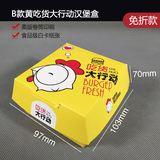一次性快餐盒已由泡沫饭盒转向环保饭盒,原来的泡沫饭盒由于不耐高温,且制作过程对环境造成破坏被淘汰,取而待之的有塑料饭盒,纸制饭盒,木制饭盒,降解饭盒等等。
Disposable fast food boxes have changed from foam lunch boxes to environment-friendly lunch boxes. The original foam lunch boxes have been eliminated due to their high temperature resistance and environmental damage caused by the manufacturing process. Plastic lunch boxes, paper lunch boxes, wooden lunch boxes, degradable lunch boxes, etc. are available.
纸板型
Cardboard type
纸板快餐盒是以300克-350克的漂白硫酸盐木浆纸板为原料,通过类似钣加工的冲压成型工艺进行模切黏合或模切压制、定型等工序制成。为防止其渗油或渗水,要在其表面淋膜或施用化学助剂。在生产与使用过程中对人体是无毒、无副作用的。但对于纸板的质量要求较高,随之成本也提高。
Cardboard fast food boxes are made from 300-350 grams of bleached kraft wood pulp cardboard as raw materials, and are processed through stamping processes similar to sheet metal processing, such as die-cutting bonding, die-cutting pressing, and shaping. To prevent oil or water seepage, a film should be coated on its surface or chemical additives should be applied. It is non-toxic and has no side effects on the human body during production and use. But the quality requirements for cardboard are high, and the cost also increases.

淀粉型
Starch type
以淀粉为原料的可食用型快餐盒,顾名思义,它是以淀粉类植物为原料,加入膳食纤维和其他可食用类助剂经搅拌捏合而成,它采用生物复配、聚糖交联、钙离子螯合等技术精制而成,使用温度是-10度至+120度,所以特别适合盛装热饭热菜,可在微波炉里加热,更可放入冰箱冷藏使用。
An edible fast food box made from starch as the raw material, as the name suggests, is made by mixing and kneading starch plants with dietary fiber and other edible additives. It is refined using techniques such as biological compounding, polysaccharide cross-linking, and calcium ion chelation. The operating temperature is -10 ° C to+120 ° C, making it particularly suitable for holding hot rice and vegetables. It can be heated in a microwave or refrigerated in a refrigerator.
纸浆模塑型
Pulp molding type
其制作过程由制浆、吸附成型、干燥定型等工序完成,对环境无害;可以回收再生利用;体积比发泡塑料小,可重叠,交通运输方便。纸浆模塑,除作餐盒、餐具外,更多做工业缓冲包装,发展十分迅速。
The production process is completed by processes such as pulping, adsorption molding, drying and shaping, and is environmentally friendly; Can be recycled and reused; The volume is smaller than that of foam plastic, can overlap, and is convenient for transportation. Pulp molding, in addition to being used for lunch boxes and tableware, is also used for industrial cushioning packaging, and its development is very rapid.
植物纤维型
Plant fiber type
在环保优势上,植物纤维餐盒具有明显的优势,它是以稻草、稻谷壳、甘蔗渣等提取的植物纤维作为原料,加入成型剂、黏合剂、耐水剂等助剂搅拌通过成型机成型,加以干燥、整形、消毒等后期加工而成。这些农业的下脚料可成为工业原料,有助于农业资源的综合利用。
In terms of environmental advantages, plant fiber lunch boxes have obvious advantages. They are made from plant fibers extracted from straw, rice husks, sugarcane bagasse, etc., and mixed with forming agents, adhesives, water resistant agents and other additives through a molding machine. They are then dried, shaped, disinfected, and processed in the later stage. These agricultural residues can become industrial raw materials, which contribute to the comprehensive utilization of agricultural resources.
可降解塑料餐盒
Degradable plastic lunch box
此类餐盒的制造原料是可降解塑料,所谓可降解塑料就是在塑料的生产过程中加入一定量的添加剂,如光敏剂、淀粉等原料,这样,可降解塑料制品在使用完,并废弃在大自然中暴露三个月后,可由完整的形状分解成碎片,因而改善了环境。
The manufacturing material for this type of food box is biodegradable plastic, which refers to the addition of a certain amount of additives such as photosensitizers, starch, and other raw materials in the plastic production process. In this way, after being used up and discarded in nature for three months, biodegradable plastic products can decompose into fragments from their intact shape, thus improving the environment.
生物全降解餐盒
Biodegradable lunch box
生物全降解餐盒是一种比较先进的环保产品。它以淀粉为主要原料,加入一年生长期植物纤维粉和特殊的添加剂,经过化学和物理方法处理制成生物全降解快餐盒。由于淀粉是一种可生物降解天然高分子,在微生物的作用下分解为葡萄糖,后分解为水和二氧化碳。
Biodegradable lunch boxes are a relatively advanced environmentally friendly product. It uses starch as the main raw material, adds one-year plant fiber powder and special additives, and is processed by chemical and physical methods to make a biodegradable fast food box. Due to starch being a biodegradable natural polymer, it decomposes into glucose under the action of microorganisms, and then into water and carbon dioxide.
相关新闻
- 礼品盒防潮防霉预防与解决2021-05-29
- 常见的包装盒的展示2021-05-29
- 包装设计“形式”的展现文化2021-05-29
- 高端包装礼盒近年来的发展趋势2021-05-29
- 印刷样品的检查与处理2021-05-29
- 外卖打包袋厂家教你如何选择适合自己的外卖包装? 2021-06-22
- 阴雨天如何运输一次性小吃盒?2021-06-25
- 塑料餐具表面处理的方法!2021-07-02









 400-801-0899
400-801-0899




 当前位置:
当前位置:





















 鲁公网安备 37010502001692号
鲁公网安备 37010502001692号